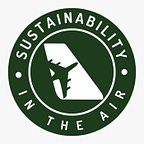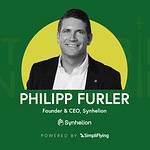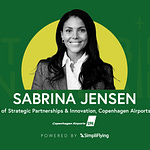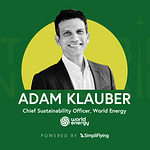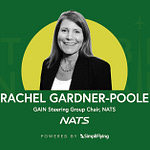In this episode of our ’Sustainability in the Air’ podcast, Jamila Yamani, Director of Climate & Energy at Salesforce, speaks with SimpliFlying CEO Shashank Nigam and shares fascinating insights into the company’s commitment to sustainability, and how the company is taking a unique approach to advancing sustainable aviation as a non-airline entity.
Yamani discusses why sustainability is important to Salesforce, emphasising that it’s not just about risk mitigation but also about leveraging their platform to accelerate the global transition to net zero. She highlights Salesforce’s role in sponsoring the Sustainable Aviation Challenge, launched by UpLink in partnership with the World Economic Forum and the First Movers Coalition, which aims to identify and elevate promising sustainable aviation technologies globally.
Here are the key highlights of the conversation:
Why sustainability matters to Salesforce (3:10)
Salesforce’s approach to managing corporate business travel emissions (6:01)
The importance of scope 3 emissions for Salesforce (12:35)
Salesforce's role in the Sustainable Aviation Challenge (16:05)
Navigating SAF certificates and off-takes (21:51)
Addressing the risks of greenwashing (25:20)
Rapid Fire! (31:55)
Keep reading for a quick overview of the episode.
Why sustainability matters to Salesforce
While Salesforce’s direct emissions (scope 1 and 2) are relatively small, most of their footprint lies in scope 3 emissions from business travel. Tackling these indirect emissions allows Salesforce to drive impact beyond their own walls. Notably, Salesforce has also tied executive compensation to achieving climate goals, including reducing air travel emissions. Not only does this create accountability at the highest levels, it also seeks to educate and create awareness among employees about sustainability and business travel emissions.
“[Approaching sustainability] is not only meant to be [from a] risk mitigation [perspective], it’s not only meant to reduce the bad that we do… it’s also about what good we can do. How can we use our platform to not only improve our own footprint, but accelerate the energy transition globally to reach net zero faster, and it’s an opportunity not just for our business, [but] for businesses across the world.”
4 ways Salesforce is advancing aviation decarbonisation
1. The Sustainable Aviation Challenge
Eager to identify and scale promising sustainable aviation technologies, Salesforce sponsored the Sustainable Aviation Challenge, launched by UpLink in partnership with the World Economic Forum and the First Movers Coalition. The challenge, led by Salesforce and Deloitte, is also supported by industry big-wigs like Airbus, Airports Council International, Breakthrough Energy, Boom Supersonic, Eni, JetBlue Ventures, Qantas and World Energy.
Announced last year, the challenge called for innovative solutions to decarbonise aviation and accelerate novel technology pathways, including sustainable aviation fuels (SAF), propulsion technologies and value chain innovations like feedstock, engineering, infrastructure and market development. Out of 130 submissions, the challenge identified 16 top innovators who are accelerating the aviation’s transition to net-zero. These innovators will receive the necessary support industry partners and investors to help scale their ventures through business and technology collaborations.
2. Navigating SAF certificates and off-takes
As part of the First Movers Coalition, Salesforce has committed to buying SAF certificates equal to 5% of their air travel emissions. Through the Sustainable Aviation Challenge and its membership at the Sustainable Aviation Buyers Alliance (SABA), Salesforce aims to acquaint itself with the most promising aviation decarbonisation solutions, and fulfil its SAF commitments through long-term offtakes.
However, a lack of clear guidance on accounting for SAF certificates as an end buyer makes writing long-term offtake agreements challenging at present, says Yamani. Salesforce made initial SAF purchases with United and JetBlue to figure out the complexities involved in the process. They eventually hope to participate in innovative multi-party SAF deals, potentially buying certificates for their scope 3 emissions, adds Yamani.
“We made some initial [SAF] purchases with United Airlines and JetBlue, a couple of years ago… to understand how do you write these contracts, how do you account for things like these. As our programme continues to evolve, I fully hope that we will be able to participate in [multi-party] deals… perhaps as an off taker.”
3. Addressing the risks of greenwashing
To avoid greenwashing accusations, Salesforce emphasises the importance of considering the full lifecycle impacts of SAF, especially HEFA fuels from biological resources. Sustainable feedstock sourcing is critical, says Yamani, as there can be major land use implications that affect local communities.
Salesforce believes in having a diverse portfolio of solutions, including power-to-liquids SAF, alcohol-to-jet SAF, electric and hydrogen aircraft — leaving no option off the table. Achieving defensible carbon reductions requires carefully assessing the entire supply chain.
“When it comes to SAF from biological resources, it’s so important to consider sustainable sourcing of biomass. And we see this not just in aviation, but in other sectors as well. There are huge land implications for local communities when you harvest energy crops for sustainable aviation… but making sure you’re doing that in the most defensible way, with a clear view on the entire lifecycle of the feedstock helps to solidify that the green attributes you’re after aren’t just greenwashed.”
4. Airline partnerships for sustainable innovation
Salesforce believes that airlines being well informed about aviation sustainability, would make for great partners to promote and encourage innovation a greener future of the industry. As an example, Qantas and United have launched major funds to invest in SAF and new technology projects, while Virgin recently operated a 100% transatlantic SAF flight.
Salesforce hopes to work with airline partners to understand how they can best contribute to decarbonising aviation.
“There are so many [airlines] that are continuing to make strides in this space… And corporate buyers like Salesforce, we want to be a part of that conversation.. [and] understand the role we can play. [We] really look to our industry partners to identify what is a good role for us because they’re the experts in the space.”
‘Sustainability in the Air’ is the world’s leading podcast dedicated to sustainable aviation. Through in-depth conversations with top aviation leaders, we break through the clutter and provide a clear roadmap for a net-zero future.


